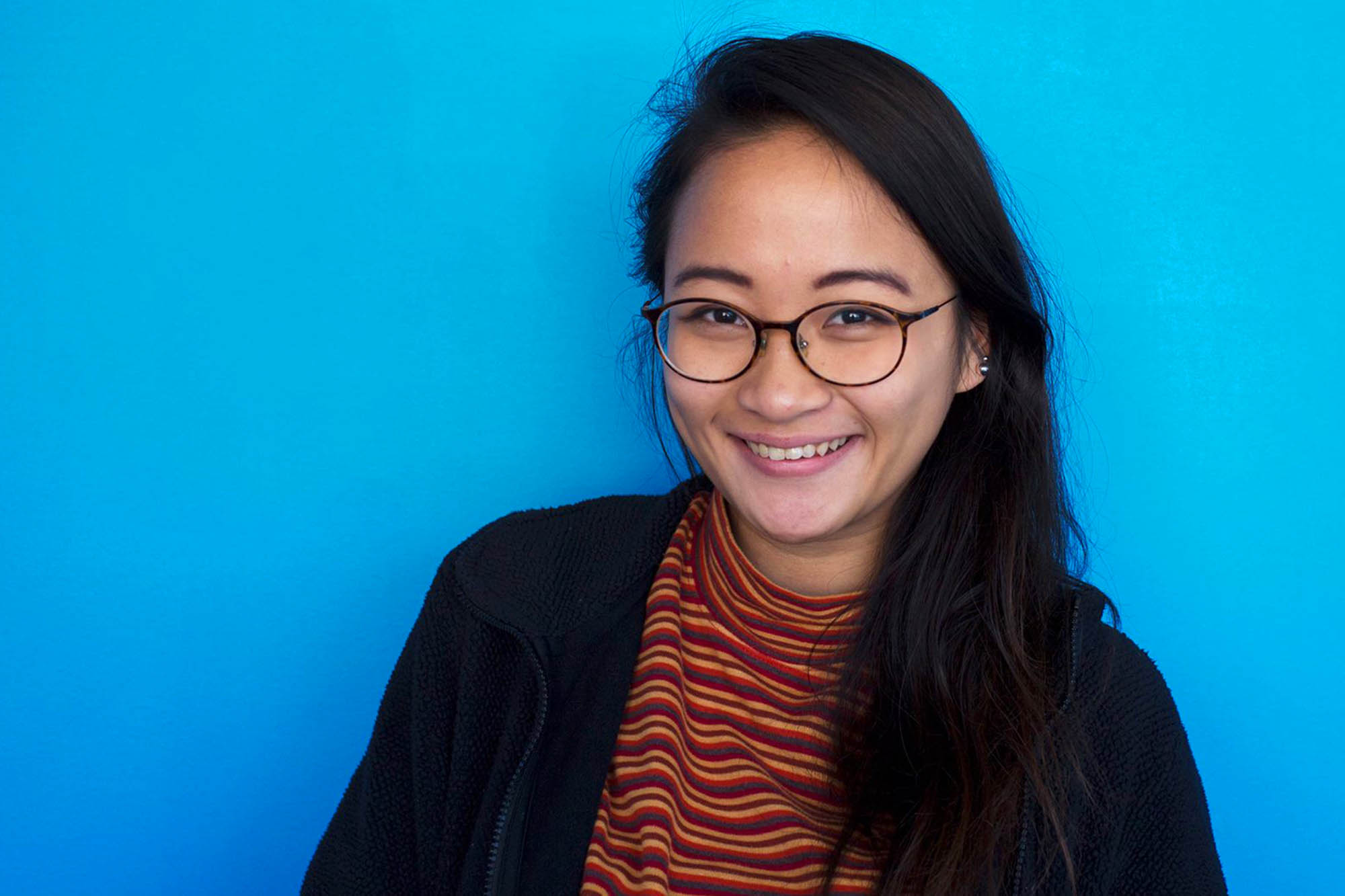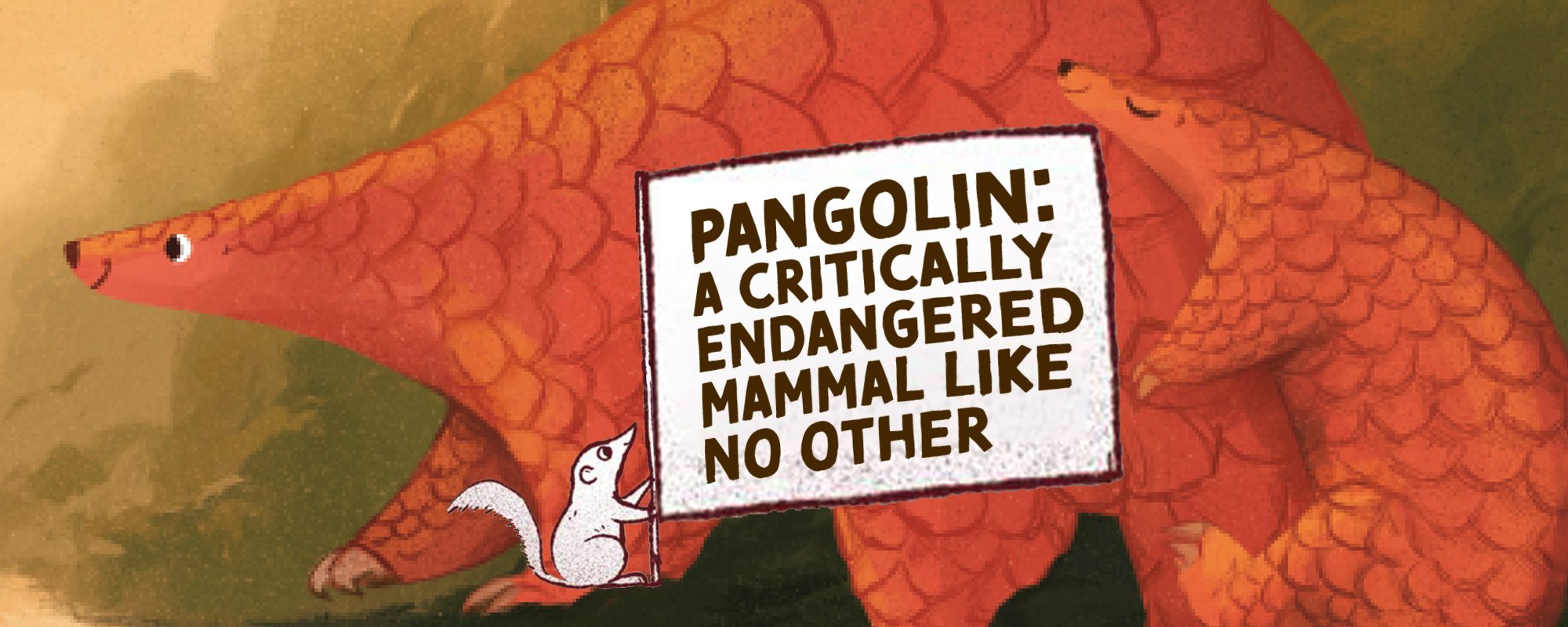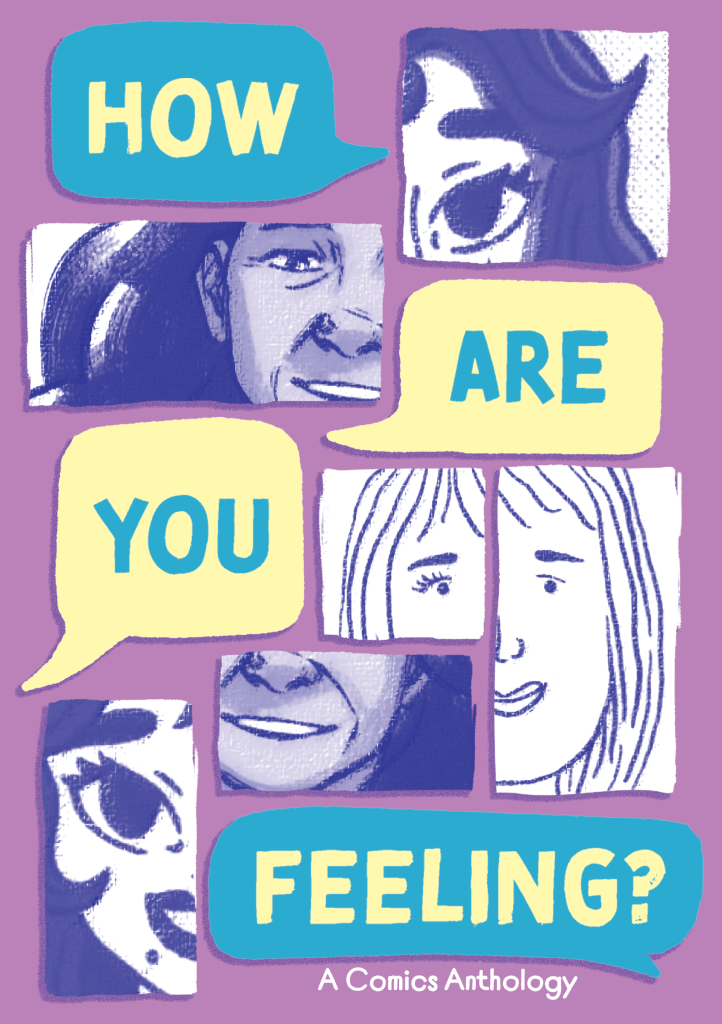
We know you have old receipts in that one compartment of your bag or leftover packaging from used-up tissue packs and boxes of snacks. Typically discarded as trash that holds no value, what if we saw them as containers of our thoughts, memories, and how we’re feeling?
We’re collaborating with queer mental health collective LONGKANGBRAIN on Yap & Scrap , a junk journalling activity taking place as part of the book launch for How Are You Feeling?, an anthology of comics on mental health, periods, and pregnancy loss.
We love the imagery of the longkang – a ditch, a gutter, or drain – as we think of accessing the forgotten corners of our mind, the dredges of our thoughts and emotions, and the gaps in our knowledge. It’s time to embrace their call for a metaphorical brain drain – to get all our feelings out of our heads and onto the page so that we can have those conversations as a community!
As the LONGKANGBRAIN duo Nico and KC get crafty with their own junk journals in preparation for Yap & Scrap, we caught up with them on the process and got them to share their thoughts and feelings in response to the journals they’ve lovingly put together.
Read on for the incredibly heartfelt and introspective interview with LONGKANGBRAIN, and register for the book launch on 20 September at howareyoufeeling.peatix.com.
Tell us about yourselves and Longkangbrain. How did Longkangbrain start?
KC and Nico: We are currently a two-person non-profit focused on mental health, and we also often intersect with LGBTQ+ topics due to our backgrounds. We mainly create content on Instagram for awareness and do physical events where we encourage conversations, sharing of resources, and discussions on how we can support ourselves and one another.
LONGKANGBRAIN came about from the need to remind people they are loved in spite of the challenges society imposes on anyone who lives outside of the status quo. What started out from the desire to build a safe space for difficult conversations has grown into something that feels like home.
What has your headspace been like this week? How have you been feeling?
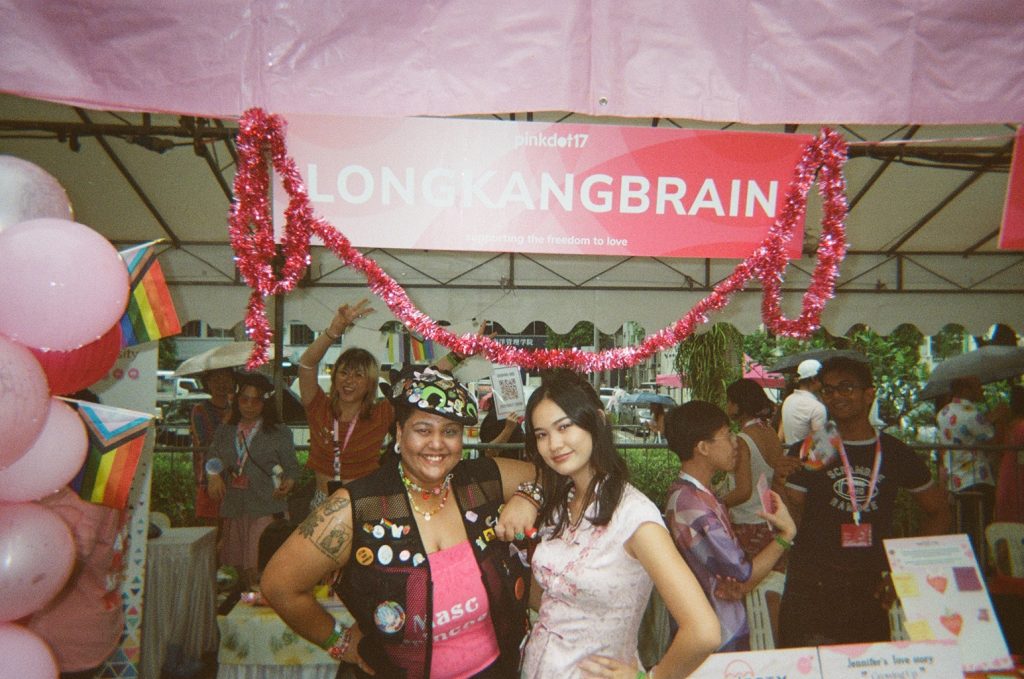
KC: I have been quite anxious and experiencing mixed feelings as I’ve just started a new role at work and there are a lot of tasks even though it’s only my second week. I also started my first medication routine after a recommendation by the doctor. However, I have been trying to self-regulate by telling myself “one day at a time”, which has been reassuring.
Nico: I have been tired as the appointment with my neurologist keeps getting postponed and my migraines have been bad. The follow-ups with my gynaecologist have also been hard post-surgery. Because it’s a subsidised clinic, appointments are far apart. My frequent, unexplained cramps have returned and it’s exhausting having to wait to see the doctor. Between the ache in my abdomen, nauseating headaches, bringing my cat, Tofu, to the vet for his asthma, and looking after my grandmother with dementia, I’ve been busy trying to get through one day at a time. I’m grateful for having an alternative form of journalling this week when DE reached out to us about junk journalling!
Tell us about your junk journal. How would you describe it? What have you included and why? What kind of emotions, memories, stories, or thoughts do these items bring to you?
KC: My junk journal is about my struggle with my period pains. It’s typically so bad on the first day that I have to take medical leave and sleep away the pain with painkillers and a cup of mum’s herbal tea. After years of taking painkillers every month, a new doctor at my usual clinic suggested that I get myself referred to a specialist as it could be something larger that is affecting me. That was my first time going to a hospital for a potentially chronic illness and I was told that I could have endometriosis. The challenge is that it’s typically undetectable on ultrasound, but worsens over time. She suggested starting medication to stop periods entirely.
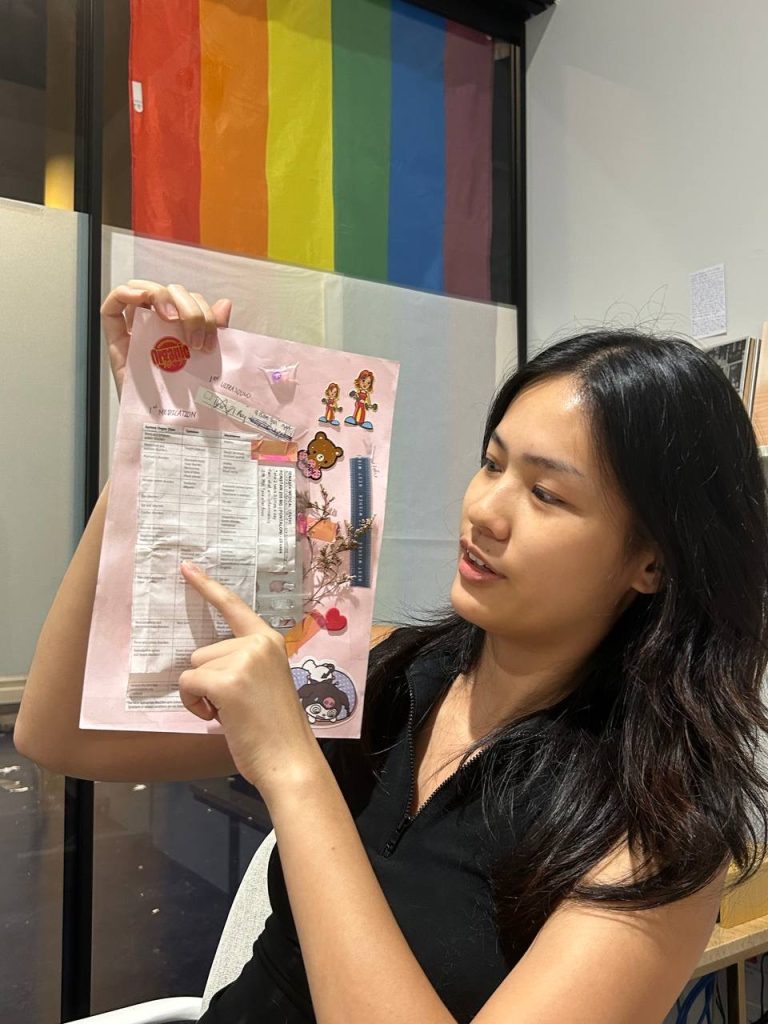
While I was happy because I’ve never wanted children and never saw the need to have my period, I realised I had mixed feelings as having periods has always been tied to womanhood in society. It’s also coupled with the uncertainty of whether the diagnosis is accurate (it can never be 100%, only predictive) and fear of the medicine’s side effects. I also had doubts – everyone says period pains are “normal”, but what is normal?
My junk journal showcases my previous medication from the clinic and my new medication’s side effects table, all neatly capitalised and bolded at the headers – wow, very official. I included the sticker that says “fabulously organic” because I’ve always been confident about how my body is relatively healthy but now the medicine may affect my lifestyle of wanting to be healthier by working out, managing my emotions well, and more.
I kept two AA beads trapped in clear tape because I felt like what I am experiencing is a tiny unheard scream. But I don’t feel the need to scream it out loud despite wanting someone to acknowledge the contradicting feelings of being relieved yet uneasy about what I am going through. I’m glad there’s a solution, but the uncertainties can’t seem to erase the tiny “AAHs” in me.
Nico: My junk journal is inspired from years of receiving important medical information in inconspicuous white envelopes and the grief I felt after a surgery to remove ovarian cysts last year.

Like many women, I was misdiagnosed and only taken seriously after suffering serious detriment to my health: I was suffering from extreme cramps and bleeding for a year. It was brushed off as a symptom of PCOS (Polycystic Ovary Syndrome) and I was immediately subjected to the labels that are commonly associated with this illness: Indian, weight management issues, and stress. A repeat ultrasound was performed after an episode of vertigo and severe cramping, but with the wait time for subsided women’s healthcare, it was a long time before I finally received a diagnosis that required immediate treatment and felt the relief of having the world not judge me for the pain and fatigue.
That whole ordeal was something that stayed with me, and even now as I revisit similar themes for this journal, it feels like a fever dream. The ribbon symbolises the gentleness a woman is supposed to carry with her through life, the dyed reddish brown ink symbolises blood and the taboo and ugly truth of menstruating in a largely misogynistic society: the type of shame and misogyny that some women carry as they project what is expected of us in society. The letter was written the day after my surgery.
Though it was nowhere close to the experience of bearing a child, I grieved the loss of this entity (the cyst) inside of me that grew for years. Throughout the journey, between friends, I called her Amy. When they removed her, I found out she had a twin cyst(sis)ter and I named her Amette. It was a conflicting experience and through it, I learnt a lot about my body and my instincts.
The food labels are an ode to the cravings I had, the labels that mocked me each time I was told my weight was the reason why I was in pain, the calories that were deemed responsible for my cysts. The hospital appointment booklet, from the time before appointments were done through an app, shows some of the earlier appointments I had. The pills taped to it with a highlighted list of cautions was from a period where it felt like all solutions were just a bandaid – hence the bandaid stuck on with wrappings from 42.5cm pads I had to use. I would bleed through them quickly.
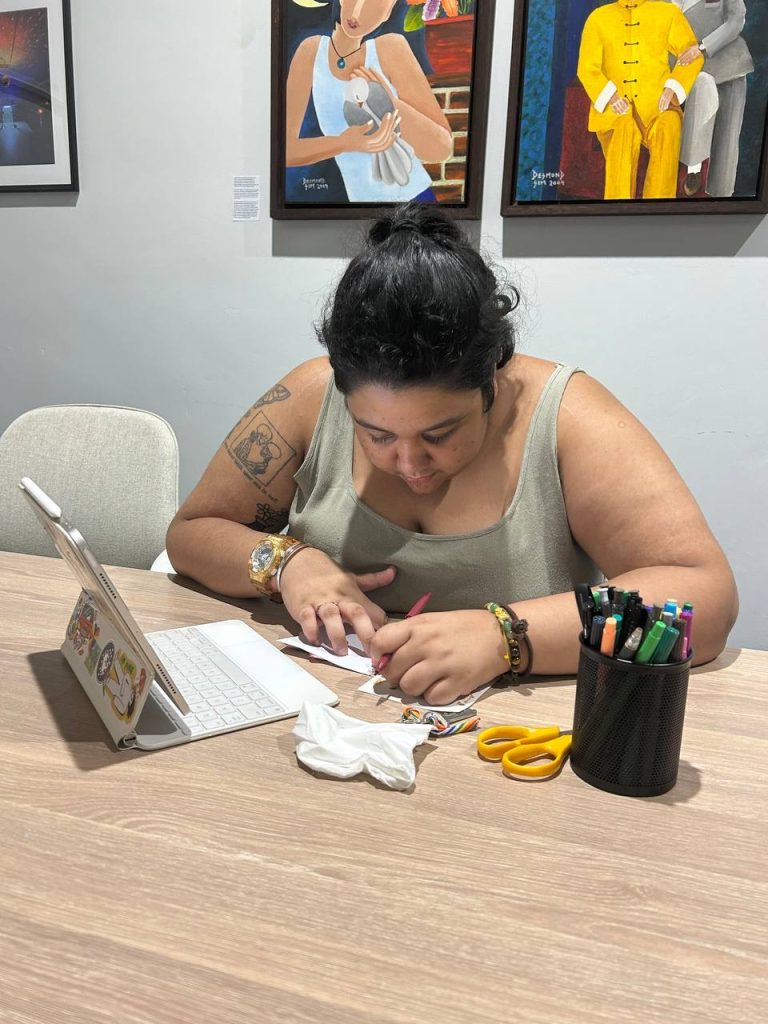
From 2023 up till September 2024 I had consistent bleeding. Somewhere during those few months they agreed surgery was needed. Leaning on bandaid solutions was not enough. The lace and picture of a random married couple was my impression of what I believed people around me perceived I needed to be. The mirena booklet given to me before my IUD implantation, together with my note and the cut out piece of letter from a law firm, were parts of my story that were significant and affected my well-being. Another piece of significance in this junk journal is the piece that says “A woman’s world” with the flip side showing an explosion. I liked the implications of that and how it represents what a lot of us feel.
Lastly, the concept of stars is in reference to the note I wrote after my surgery. To quote a short part of it,
“im sorry i cant be your home anymore, you will always be my first angel. fly high girlboss. may you grow into the beautiful white force to be reckoned with, you’ve always aspired to be. Look after amette too, you’ll go far together. mayhaps one day your kind will be host for new miracles in this thing we call evolution. you were simply just ahead of your time. and that’s not your fault. till then, stay hydrated and beautiful babygirl<3 love, su’s right ovary and su by extension.”
A part of me believes that with the number of women experiencing similar issues and looking at how far we’ve come along in evolution, part of my surgery and removing a dermoid cyst that had teeth and hair feels like hope for a future where these weird occurrences can be understood better. Till then, losing something that had life felt like grieving the loss of a part of me, and the thing that gave me hope was the magnitude of the universe and the stars that we come from and return to.
How do you feel about the junk journal you’ve made or junk journalling as a process? Was there anything that surprised you as you did it?
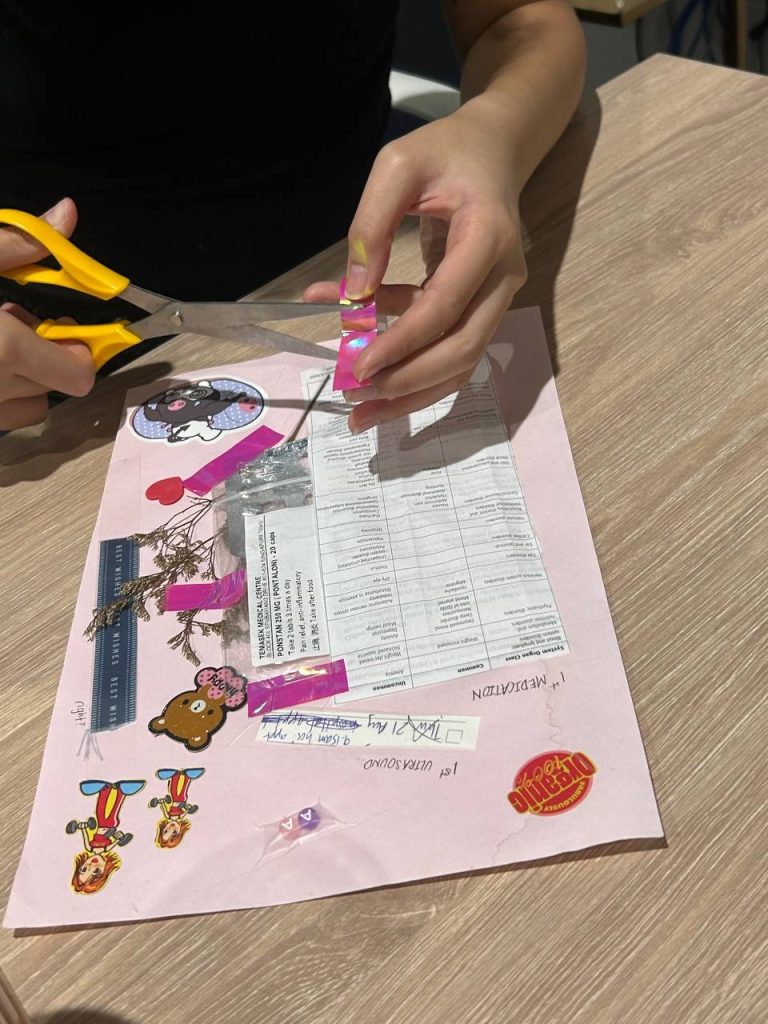
KC: I’m surprised that my junk journal helped me put my thoughts and emotions into a series of events that led up to my current mood. I am not the best with words, so expressing that by collaging meaningful items instead was easier for my head to process.
Nico: As someone who loves to craft and scrapbook, junk journalling is something I’ve always found to be therapeutic and deeply personal. I think playing around with different materials, colours, and mementos adds a layer of authenticity that words alone cannot provide. This was my first time doing crafts, let alone a junk journal, about my experiences seeking gynaecological help in Singapore. The stories shared in How Are You Feeling? A Comics Anthology inspired me to take that step and share this piece of my story to the world.
I was surprised to find that the anger and pain, though still a big part of my story, were not the main fuel for my junk journal. The desire for at least one other person to resonate with my experience and find solace in the normalcy that surrounds the experiences of the female body was what fueled my junk journal.
What do you think is the relationship between your material environment, the world around us , and our mental health?
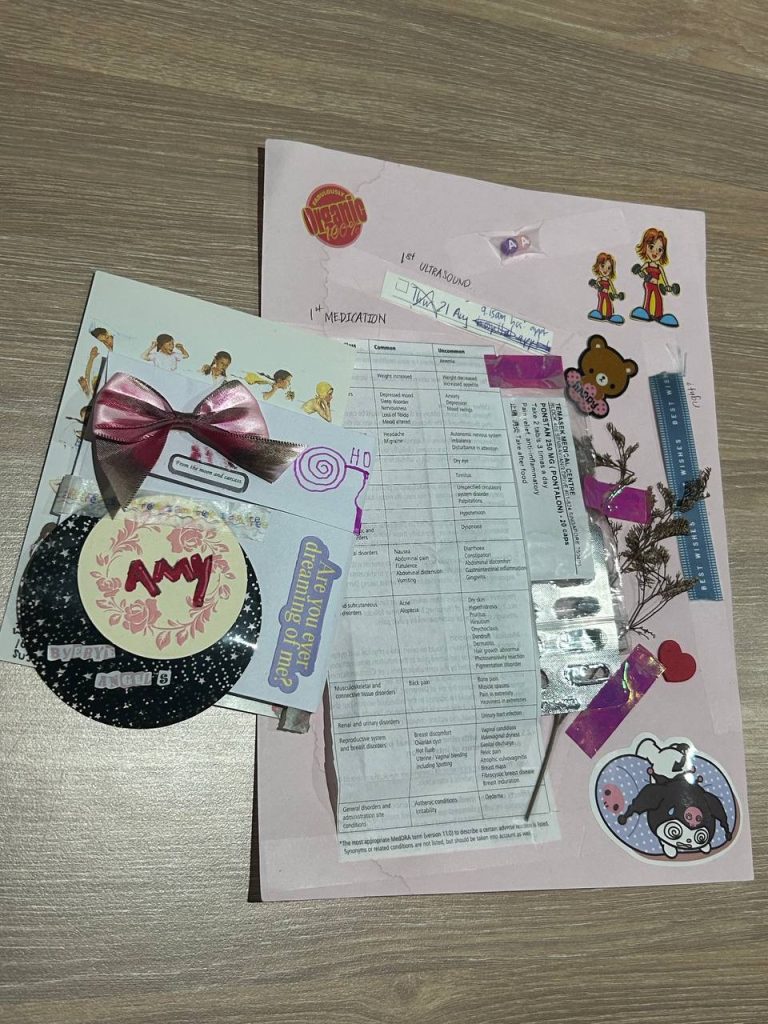
KC & Nico: Every little thing around you can influence you, but your mental health and the way you feel about yourself is what ultimately influences how you interpret and interact with the world.
An example that reflects this relationship clearly would be Maslow’s Hierarchy of needs. As human beings, our fundamental ability to survive and thrive is dependent on factors such as access to food, rest, shelter, sense of security, healthcare, employment, and community. There is a direct correlation between the state of our mental wellbeing and having our needs met. As the world around us shifts, finding ways to ground ourselves and lean on support is so important.
In a face-paced environment like Singapore that does not prioritise mental health and a balanced lifestyle, we, as community leaders, aim to build new ways for the community to come together and grow. No one can or should do it alone. We thrive when we are understood and cared for.
What’s the biggest challenge for you when it comes to the work you do as Longkangbrain and making space for people to talk about issues that aren’t discussed enough?
KC & Nico:
- Reaching out to a larger audience as the people that are interested in our online content and workshops typically already have some interest in mental health and want to educate themselves on it.
- Finding mental health statistics that are based on Asia and Singapore that can supplement our work. This issue is directly related to the lack of importance given to this in our society.
- Certain conversations that we find are extremely important are silenced in our society. This makes it hard and unsafe for us as a community group to hold space for these conversations without fear of reprimand and backlash. Access to the internet and international resources feel just out of reach, and this affects marginalised groups in ways that can feel claustrophobic due to the taboo and fear present in society.
Images courtesy of LONGKANGBRAIN.
ABOUT LONGKANGBRAIN
A non-profit by Nico & KC supporting mental health and the LGBTQ+ community. LONGKANGBRAIN creates safe spaces for difficult conversations and embraces the intersections of our diverse community.

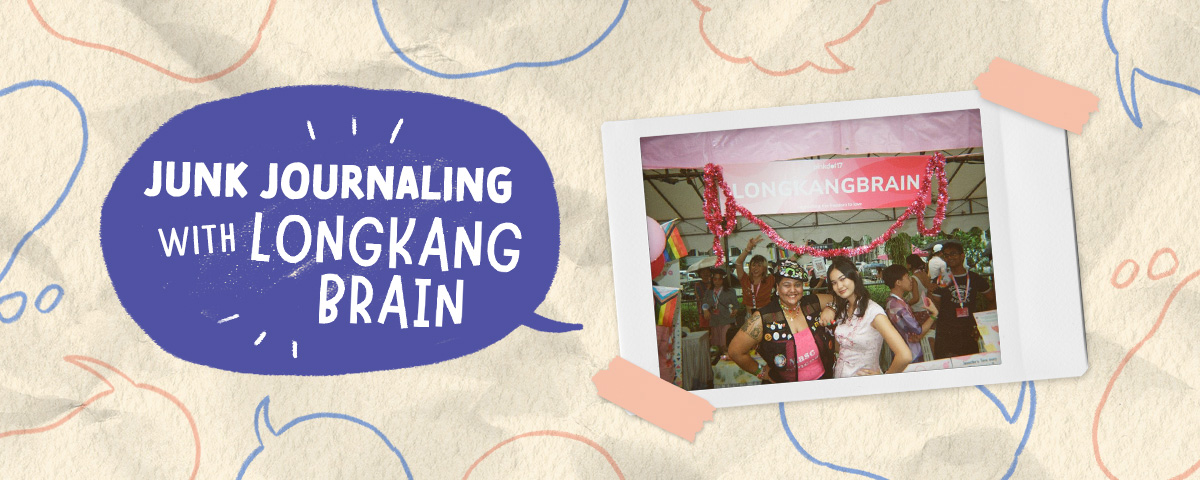

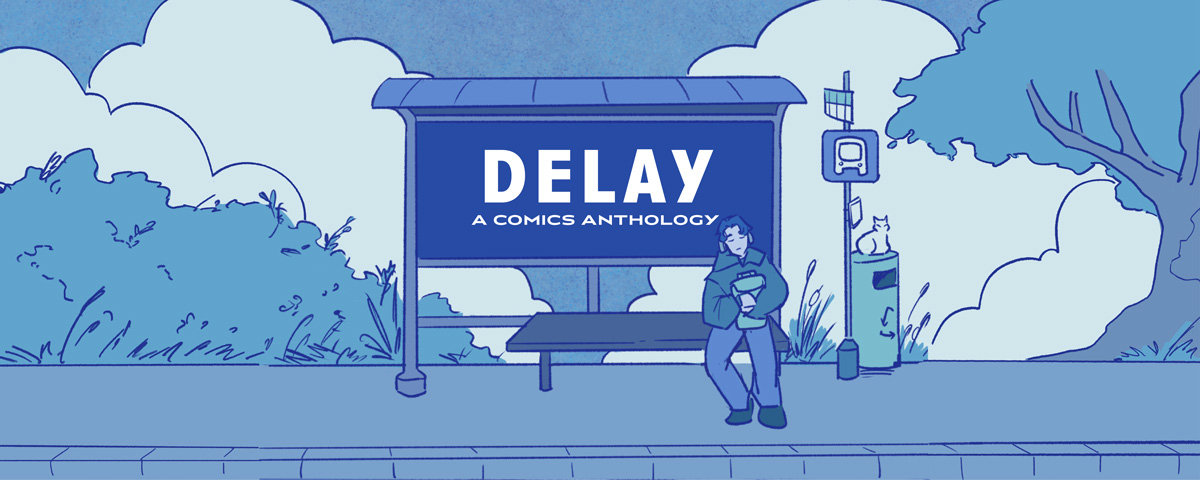
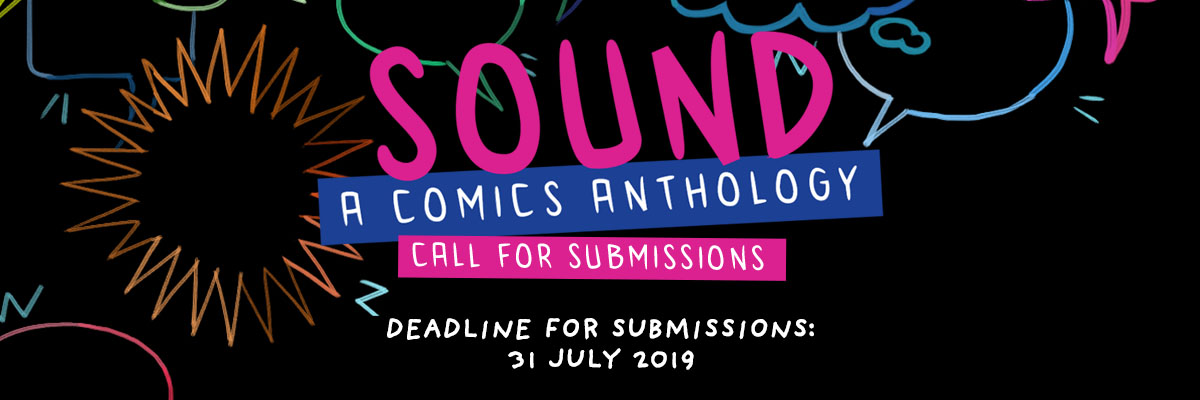
![[PRESS RELEASE] Difference Engine Unveils 2024 Catalogue](https://differenceengine.sg/wp-content/uploads/2024/02/DE-Catalogue_1200x480.png)
